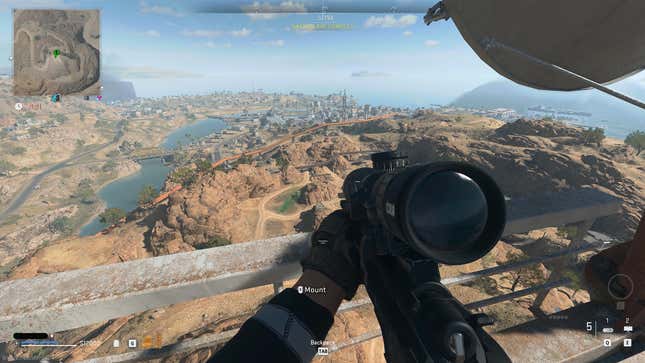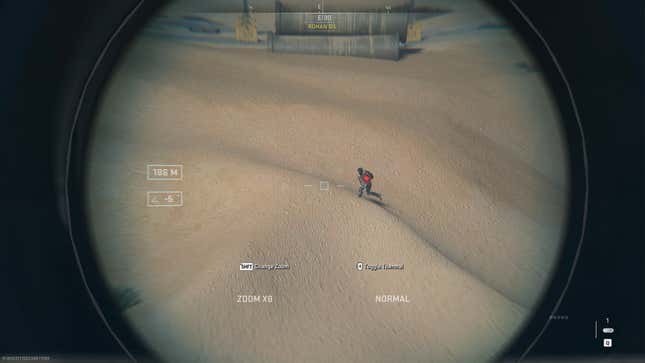Racing to the last possible helicopter to flee an increasingly radiated map, my heart is pounding. I know the chopper is going to sit there for nearly two minutes, and here I am running, alone and vulnerable. I sped halfway across the map in a truck to outrun the radiation and must now defend my position to escape. I looted a three-plate armor vest, a large backpack, durable gas mask, and at least three or four keys to locked areas.
Racing to the helo, I take down a few AI, hop in…and then spot a player with their back to me. I raise my sniper rifle and fire off a silenced shot: Their armor cracks and I realize that in my haste I forgot to load a full magazine before opening fire. For the crime of breaking the cardinal rule of first person shooters, that player turns, I freeze, and they murder me. All that loot is lost. And yet, I’m ready to deploy again.
DMZ launched with Call of Duty’s updated battle royale, Warzone 2.0. While it uses the same map as the battle royale, the objectives are very different. In a battle royale, the goal is to be the last one standing; but in DMZ, you’re probably in more trouble the longer you stay on the map. Teams of three are tasked with scouring the map, fighting off vicious AI forces, gathering loot, and accomplishing a variety of faction missions, contracts, and the like. It’s a very freeform multiplayer game that modulates between fierce competitive PvP showdowns, gritty PvE firefights, stealth gameplay, and open-world quest crawling—oftentimes all of those at once. CoD may not be the first property to execute this kinda game, but DMZ is one of the most streamlined and approachable attempts yet. And I hope other games copy this mode into oblivion because, when it’s done this well, I can’t get enough of the extraction shooter genre.
DMZ has been the first game to break me of my 20-year commitment to standard, team-based FPS matches. Battle royales, while interesting and sometimes fun, couldn’t do it. Hero shooters (in my case, Siege) got close, but the foundation of team-based multiplayer was still there. And while I’ve definitely logged many hours in Destiny 2, I am emotionally unable to handle that game’s PvP. I also grow tired of needing to keep track of RPG stats when I’m really just looking for a test of my reflexes and know-how about weaponry and equipment.
DMZ preserves the reactiveness of a first-person shooter without requiring you to memorize too many stats. And it also allows for emergent moments of thrilling FPS gameplay—the kind I’d expect from a really well-done single-player campaign, but without any of the narrative wrapping. It’s all live, on the spot, in the moment. Here one moment, gone the next.

Here’s one example. In DMZ there’s a train that rides around the map. It’s easy to board, and you’ll likely find some great loot in there. One evening, a friend and I hopped on and cleaned out the cars. As we looked at the map to plan the best route to an extraction zone, we heard (and saw on the map) an enemy vehicle driving next to the train car. What followed was a shootout between two moving vehicles.
I’ve done this in games before, of course. Uncharted 2 has perhaps one of the most memorable “train run ‘n’ gun” scenarios in recent memory. But in Uncharted, I’m playing as Nathan Drake and I know that I’m moving through a scripted scenario. In DMZ, this kind of thing just happens spontaneously, and it is I (though playing an operator with a name and a cursory sketch of a fictional identity) who has to react as best I’m able, from beginning to end.
At the end of Uncharted 2’s train sequence, Nathan Drake fires off a heroic shot at a propane tank, saving himself and blowing up everything else in the process. The game doesn’t let you as the player do that; it’s a part of the story and Drake gets out every time. But in DMZ, it’s necessary for you, the player, to find those opportunities to save the day. And there’s no script to guide you. You’re just as likely to fail as to succeed.
I’ll be truthful: My friend and I got absolutely wrecked by that three-person party that rolled up. My death was at the hands of someone who leapt onto the train and knifed me. There was no way of knowing this was going to happen. This specific sequence of events will also never happen again. Sure, similar situations may unfold in yet another round of DMZ, but the fleeting, ephemeral nature of these wild emergent moments that demand you react with timing, quick decision-making, and the best possible use of the gear you came in with (or found) are all spontaneous. No two deployments are ever the same, even when you have the same objective. And I think that’s why I keep replaying DMZ—because it’s always something new.
I may go in with the objective of recovering White Lotus intel (one of the game’s faction quests, not spoilers for the HBO series), but at any moment the presence of ruthless AI or other players might deny me that objective. Do I abandon it in favor of picking up a random contract? Do I just get some good loot and bounce? Do I count myself lucky to have found better gear for a future trip? Or do I attempt my best Solid Snake and try to get the objective done despite being outflanked and outgunned?

That constant tug-of-war around critical decision-making is electrifying. And unlike a battle royale, which is a downward slope of showdowns until the best or luckiest are still around, in DMZ I have to make a call as to whether or not it’s wiser to extract with what I have or keep pushing for the promise of possibly greater rewards, namely gear like armor vests, larger backpacks, better guns, and keys to secret locations. And “winning” isn’t just about how well I can aim and shoot. In fact, like a game of Dungeons & Dragons, while there are things you can “win” in DMZ, the concept of “winning” doesn’t really exist. It’s about the emergent story that unfolds from deployment to extraction. That’s what I’m here for.
Successful DMZ runs could, in theory, be completed without firing a single shot. Unlike in battle royales and other common FPS game modes, your gun is as much a defensive piece of equipment as a tool for murder. Sure, you can go and hunt AI and other players—and sometimes I do—but often the thrill of moving across a map and surviving is worth not firing a single shot until I need to stop an aggressive advance against me. And the lessons I learn as I leap in again and again, dying with victory in sight or getting out by the skin of my teeth, have nothing to do with which gun is best.
Sure, loadouts do make a difference. But take my opening example where I tried to shoot an unsuspecting player. I know for a fact that if I had I raced up to them and executed a few quick melee strikes, I’d have gotten out alive. Well, I know that now, that is. That DMZ teaches lessons like this makes it even more appealing, and that lesson is worth more than any piece of loot I could’ve exfiltrated with. Doing well in DMZ can’t be distilled into a simple in-game item or button combo. It transcends that kind of gaming into something akin, I imagine, to what other folks appreciate in sports.
But for all of the fun DMZ has brought me, its setting forces me to practice intense cognitive dissonance. It should come as no surprise that I’m not a fan of the military industrial complex; yet Call of Duty is a fantasy about that very thing—and one that takes great pride in approximating real-world conflicts and oppressions. (It’s not above altering key details in service of its narrative, however.) It’s also published by a genuinely awful company. As much as I’m enjoying this gameplay, I deeply wish it was completely unassociated from very real and awful real-world conflicts. I just want a shooty video game to play while hanging out with friends. I suppose now is a good time to remember that there’s no ethical consumption under capitalism.
Critical perspectives on the subject material of DMZ aside (if we can ever truly put that to the side), this game has been a powerful surprise and a refreshing twist on not just shooters, but also open-world games, and a variety of other genres I’ve enjoyed over the years. Yeah, the bots could be a bit more fair. And maybe spawn points need to be adjusted. DMZ is in beta, after all.
Despite its room for growth, I can’t recall the last time I was genuinely this excited to sit down for multiple rounds of a first-person shooter. As an endless story generator that spins up scenarios of randomized action and survival, few multiplayer games have come close to capturing my time and attention as thoroughly as Warzone 2.0’s DMZ has.